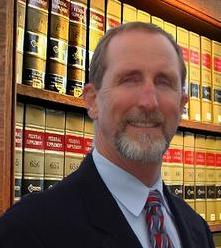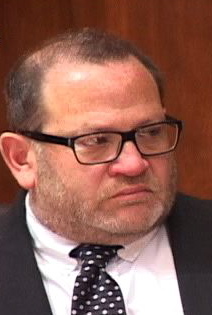Countdown to SLO County Supervisor Adam Hill’s lost office
March 23, 2020

Stew Jenkins
OPINION by STEW JENKINS
Watching Governor Andrew Cuomo as he daily leads, explains, and inspires New Yorkers to survive the Corona Virus infestation, you can see and feel earned nobility as he fulfills his obligation to serve his people. Noblesse oblige. This French term understood by the authors of the U.S. Constitution imbues every aspect of our democratic-republic. Holding elected office, at any level, is not about privileges of the office, but about obligations to serve, protect and uplift voters and residents.
Though Supervisor Adam Hill styles himself a writer and political historian, the nobility of fulfilling his duties as elected chairman of the San Luis Obispo County Board of Supervisors has never been grasped by Mr. Hill.
While residents grapple with closing businesses, losing employment, donning gloves and masks to buy groceries, Mr. Hill reportedly has disappeared and is not even available by phone or email to make decisions or sign a proclamation to take the actions needed to protect county residents in this critical time.
One need not wonder what acts Mr. Hill has done to provoke the Federal Bureau of Investigation to serve a federal district judge’s search warrant on Supervisor Hill’s office (and home?) on March 11. Whether he has now fled into hiding, hunkered down at home, or been checked into an asylum is not important, he has not surfaced to fulfill his obligations as county supervisor. At the very crucial time SLO County residents most need his leadership as supervisor, he is A.W.O.L.
So, what happens when an elected supervisor just won’t do his job?
The duties of a supervisor are so critical to the health of voters and residents, that the law does not let sloth, mental illness, alcoholism, drug addiction or moral weakness serve as excuses. California Government Code, Section 1770, provides that “An office [automatically] becomes vacant on the happening … of … (G) His or her ceasing to discharge the duties of his or her office for the period of three consecutive months, except when prevented by sickness, or when absent from the state with permission required by law.”
Absent Mr. Hill resigning, the three-month count-down began March 11.
As a former supporter of Adam Hill, I can predict that some of his most ardent acolytes will point out that Mr. Hill’s depression causes his repeated unsavory behaviors. They will argue that he falls within the exception of Section 1770 (G) because “sickness” interferes with him discharging his duties as supervisor. But other subsections of section 1770 cause this kind of defense to trigger other provisions that eject an elected office holder.
In subprovisions (B) and (L) of section 1770, an elected office becomes automatically vacant when the office holder is found by a court to be mentally incapacitated due to disease, illness, or is committed to a sanitarium as a drug addict or alcoholic.
It should be stressed that, even if Mr. Hill was subject to a 5150 mental health detention following a reported drug overdose, no court has yet adjudicated whether those conditions exist. But section 1770’s provisions denote that mental inability to handle the job is no excuse for abandoning Mr. Hill’s office.
Yet another statutory factor now seems likely to intervene.
Given that Mr. Hills’ disappearance from work and avoidance of his duties was reportedly triggered by the early morning FBI search of his office (and home?), one other important provision of Government Code, section 1770, may overtake all considerations; and sections 1770.1 and 1770.2, may bar him from taking the office he was re-elected to for four years starting in Jan. 2021.
Goverment Code 1770 (H) provides that an elected official’s office automatically becomes vacant upon “his or her conviction of a felony or of any offense involving a violation of his or her official duties. An [elected] officer shall be deemed to have been convicted under this subdivision when trial court judgment is entered. For purposes of this subdivision, ‘trial court judgment’ means a judgment by the trial court either sentencing the officer or otherwise upholding and implementing the plea, verdict, or finding.”
In short, conviction of a felony or even a misdemeanor violation of official duties ends the elected official’s hold on the office. Cases hold that it does not matter if the conviction is in federal or state court.

Supervisor Adam Hill, photo by Daniel Blackburn
It also does not matter if the elected official appeals his conviction. The integrity of public service is made paramount. So important, that sections 1770.1 and 1770.2, in summary, provide not only that a conviction immediately removes an elected official, but that it disqualifies him from taking the office even if re-elected. Bringing an appeal does not delay the automatic removal. Even if the official wins an appeal of his conviction, he is not restored to the office he lost.
It may be time for Mr. Hill to leave his stressful post to focus on his own mental health.
If it turns out that Mr. Hill is facing federal criminal charges, he is ill suited and will have no capacity to focus on the needs of his constituents. In either case, Adam Hill will not focus on your needs.
We in the 3rd District need an honest supervisor who will show up to do the job representing us and managing county’s services during this critical time. For his own and for all our good, it is time for Mr. Hill to resign so that the people of the 3rd District can have a supervisor appointed who will do the job.
His resigning now will give the governor the ability to appoint a caretaker until the next election. Delaying resignation or waiting for three months to elapse will delay the governor’s intervention. The people deserve one final service from Mr. Hill: his immediate resignation from office.
So, with apologies to the band “The Clash,” the timely question is: Should Adam stay or should Adam go now. If Adam goes, there will be trouble. But if Adam stays it will be double. Double for the county, double for the governor and no doubt double for Adam Hill.
Stew Jenkins is a San Luis Obispo public interest lawyer who handles estate planning, municipal law, open government cases, First Amendment cases and real estate law. Jenkins has served as a court appointed special master, judge pro tempore, advised on and handled initiative/referendum, legal defense of the SLO County Democratic Party, voter qualification, FPPC and other election matters.






The comments below represent the opinion of the writer and do not represent the views or policies of CalCoastNews.com. Please address the Policies, events and arguments, not the person. Constructive debate is good; mockery, taunting, and name calling is not. Comment Guidelines